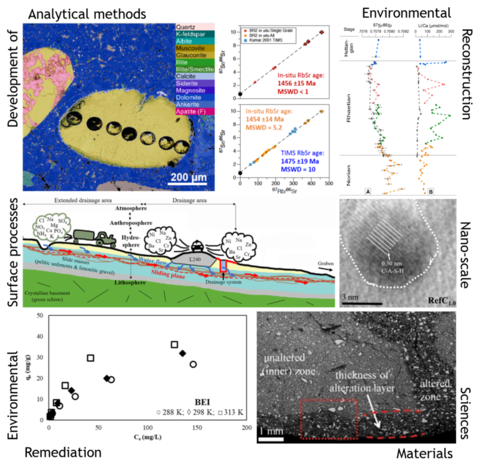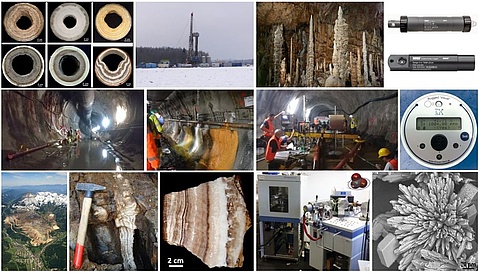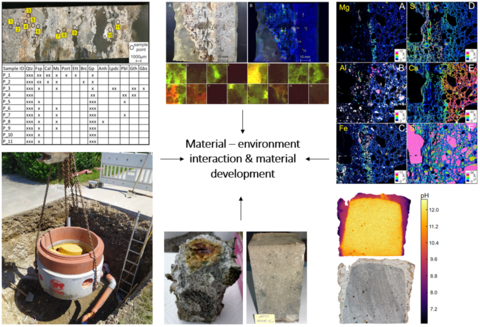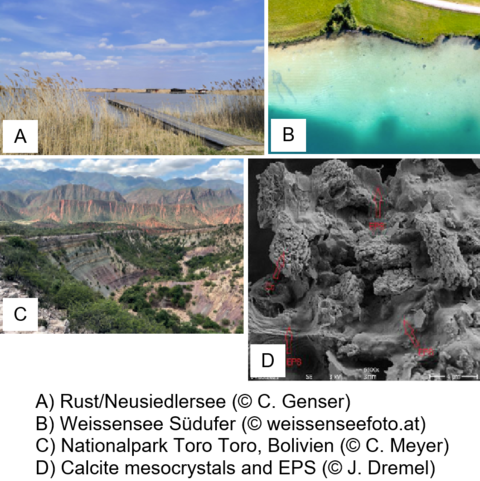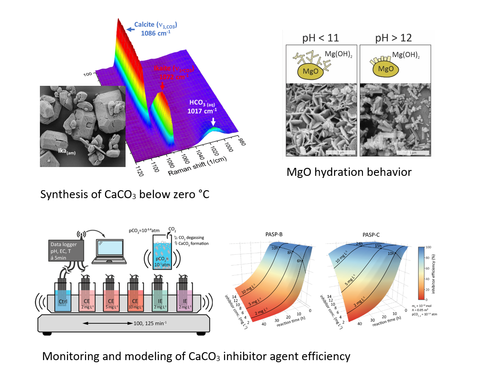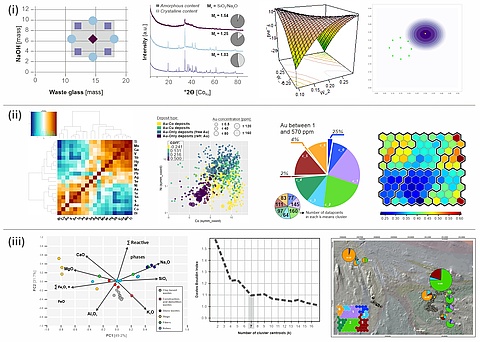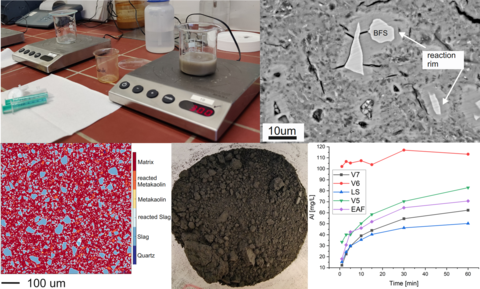Research Profiles
Andre Baldermann
Mineralogy and (bio)geochemistry
Research is centered on petrographic, (isotope)geochemical and mineralogical assessment of solid-liquid interface reactions from the nano- to bulk-scale, with focus on (palaeo)environmental reconstructions, Earth surface processes, remediation technologies, material sciences and development of novel analytical methods in geosciences.
Keywords: Clay Mineralogy; Environmental Geochemistry; Element Cycles; Fluid-rock Interaction; Interface Processes.
Contact: Andre Baldermann
Ronny Boch
Geochemistry and Environmental Monitoring
Focus of my research, teaching and consulting activities are subsurface geosystems. This includes access to deep reservoirs in the course of geothermal energy exploitation, tunneling, storage operations, caves, speleothem and vein formation and diverse mineral deposits.
Hydrogeochemical processes are related to geology, hydrology and (micro)biological conditions underground. Methodological approaches involve field-based sampling strategies and data loggers, laboratory analytical and experimental work, as well as computer modeling. Bridging the gap between fundamental research and practical application is targeted.
Keywords: fluid-solid interaction, environmental archives, forensic approach, mineral precipitates, carbonates.
Contact: Ronny Boch
Amr Hussein Mokhtar Hassan
Construction binders and reinforced concrete
Development of an emerging class of inorganic waste-based cementitious materials and their tuning for diverse civil engineering applications via: (i) Microscopic investigations encompassing chemical and microstructural assessment (ii) Macroscopic evaluation assessing mechanical, durability, and structural performance.
Keywords: Alkali-activated materials, sustainability, mechanical behavior, reinforced concrete, durability.
Contact: Amr Hussein Mokhtar Hassan
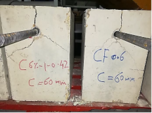
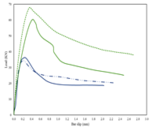
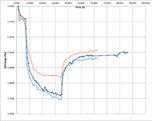
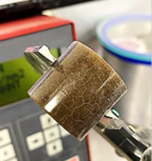
Cyrill Vallazza-Grengg
Applied Mineralogy and Material Sciences
Fields of research include applied minerology and material sciences with focus on the development of inorganic, cement-based building materials and the evaluation of performance/deterioration mechanisms of the latter in various (bio)chemical aggressive environments, based on microstructural, chemical, mineralogical and environmental proxy.
I am involved in several national and international projects and an active RILEM member (https://www.rilem.net/), currently working in two technical committees (TC – MCI 253 and TC – CCC) focusing on alkali activated materials and biochemical concrete deterioration.
Keywords: cement-based and alkali activated material; biochemical concrete deterioration; environmental proxies.
Contact: Cyrill Vallazza-Grengg
Dorothee Hippler
Sedimentary petrology and geochemistry using elemental/isotope proxies
My research focuses on field-based, petrological and geochemical approaches to investigate the formation mechanisms of terrestrial carbonate and silicate deposits in relation to (paleo-) environmental conditions. One emphasis addresses the potential of lacustrine carbonates as environmental archives and local carbon storage systems in alpine settings, the second deals with water-rock interaction and the neoformation of alumosilicates in cryospheric terrains and the last one targets the links between deposystem and climate evolution and dinosaur diversity for the Jurassic-Cretaceous and Cretaceous-Paleogene boundaries in the northern Chilean and Bolivian Andes.
Keywords: (paleo-) lake systems, seasonality, extracellular polymeric substances, monitoring, natural carbon sequestration, element ratios, stable isotopes, provenance, U-Pb dating (detrital zircons).
Contact: Dorothee Hippler
Michael Pettauer
Applied mineralogy, dissolution/precipitation experiments and hydrochemistry modeling
My research focuses on the understanding of the processes regarding mineral nucleation, growth and transformation and in particular on the evolution of different types and morphologies of amorphous to crystalline precipitates from aqueous media. For instance, the MgO-CaO-H2O-CO2 and CaCO3-MgCO3-H2O-CO2 systems are studied in the scope of solid-liquid-gas reaction kinetics and mechanisms including various organic and inorganic additives, where temperature ranges from far below zero degree centigrade up to hydrothermal conditions. Individually designed experimental setups, coupled with advanced monitoring tools and hydrochemical modeling approaches, are used for applied research questions to be addressed for a fundamental process understanding.
Keywords: applied mineralogy, hydrochemical modeling, green scaling inhibitors, monitoring, magnesia, carbonates, polymorphs, mineral nucleation and growth.
Contact: Michael Pettauer
Marjorie Pons Pineyro
Investigation of new potential supplementary cementitious materials (SCMs) for development of low-carbon cements.
Focusing on early hydration aspects, reaction mechanisms, durability assessment, and effects on the mechanical properties of both ordinary and sprayed concrete.
Contact: Marjorie Pons Pineyro
Sara Raič
Current fields of research and areas of expertise: (i) Applied mineralogy: alternative activator development for novel inorganic building materials. (ii) Ore geology and geochemistry: mineral systems modelling of battery minerals and critical raw materials. (ii) Applications of machine-learning methods to multivariate-geoscientific datasets.
Franziska Stamm
Experimental geochemistry and stable isotopes
My research focuses on fluid-mineral interactions at low temperatures, critical for Earth's surface processes like silicate weathering, that involves mineral dissolution, transformation, neo-formation etc.. Experiments are designed and conducted to understand these processes by analysing stable isotope signatures, especially silicon (Si) at different temperatures, fluid pH, aqueous element complexation, and the presence of distinct organic ligands. My goal is to reveal and assess the effect of the given physicochemical conditions on the reaction kinetics and mechanisms and on kinetic and equilibrium stable isotope fractionation of Si during the formation, dissolution, and structural transformation of amorphous and less-ordered (Al-Fe) silica phases. To achieve this, I employ experimental methods, including two-component batch reactor experiments, along with traditional and innovative analytical techniques.
Keywords: Fluid-mineral interactions, stable isotope fractionation, amorphous silica, diagenesis, experimental methods
Contact: Franziska Stamm
Florian Steindl
Applied mineralogy and cement chemistry
My research is focused on chemical and mineralogical aspects of construction materials; e.g. durability and hydration processes in Portland-cement based concretes, development and characterisation of sustainable cement-based binders, experimental crystal growth of hydrated cement phases.
Keywords: applied mineralogy, construction materials, cement, durability, hydration.
Contact: Florian Steindl
Stefanie Radinger
Applied Mineralogy, Material Sciences and Geotechnical Engineering
Central focus of research is the development and investigation of waste-based alkali-activated construction materials through mineralogical, microstructural, and mechanical analyzing which is accompanied by verifying the suitability of the respective materials regarding various application fields. Additionally, research work is related to geotechnical aspects and challenges, like slope stability, erosion, and sustainability of geotechnical structures.
Keywords: Construction Materials, Development, Application, Sustainability
Contact: Stefanie Radinger
Katharina Maria Weisser
Applied Mineralogy
My research is centered on the investigation of mineral waste materials, like steel slags and ashes, evaluating their inherent potential and applicability, and devising methodologies to enhance their utility and value. This initiative is anticipated to minimize the accumulation of wastes in landfills, alongside a decrease in CO2 emissions resulting from recycling processes.
Keywords: sustainability, up-cycling, minerals wastes, CO2 reduction
Contact: Katharina Maria Weisser
Iris Zögl
Applied mineralogy and data analysis of alkaline materials
My research revolves around exploring chemical, mineralogical, and economic dimensions of waste-based alkali-activated materials (AAM) derived from industry. By utilizing empirical and statistical-mathematical methods, such as Design of Experiment and Life Cycle Assessment, I explore their viability as AAM-components.
Keywords: Alkali-activated materials, design of experiments, life-cycle assessment, waste-based materials.

